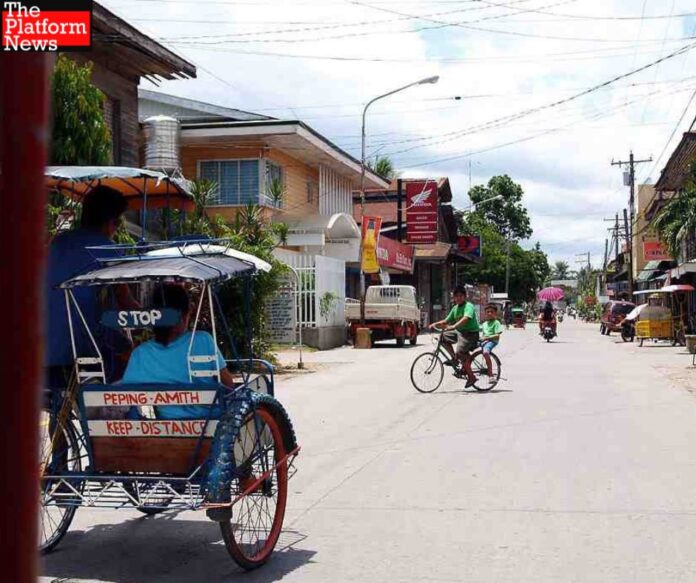Leyte, Philippines–Amidst the challenges faced due to poor air quality, global warming and climate change, a substantial number of the local folks in the Visayas prefer a mode of public transport they consider environment-friendly and produces zero emissions—the iconic pedal-driven three-wheeler rickshaw locally known as “pot-pot.”
The “pot-pot” has been around since the late 1970s in Palompon, Leyte as well as in many parts of Eastern Visayas, including in the provinces of Leyte, Biliran and Samar.
Being pedal-powered, the “pot-pot” retains its relevance not only for its usefulness for the commuting public, but also for the simplicity of its mechanism as a way to address head-on the very cause of climate change.
Last March 23, during the observance of Earth Hour in Palompon, the organizers acknowledged the importance of the “pot-pot” in protecting the environment and maintaining clean air. The municipal government, headed by Mayor Ramon Oñate who spearheaded the activity, included a contest for “pot-pot” decorations.
The “pot-pot” dominates Palompon’s streets to this day, as they carry around up to three passengers for short trips for reasonable fares ranging from P5 to P10. Unlike other towns and cities that have phased out the “pot-pot” in favor of motorized conveyances, many Eastern Visayas towns still use the “pot-pot” as a primary public transport.
What’s even more amazing is that Palompon itself has a well-designed walkable town center (poblacion), enabling me to conduct my transactions without taking any public conveyance, which I can’t say for other towns and cities.
Having lived in an urbanized provincial city in southwestern Luzon for seven years, I find that my three-day visit in Palompon has been such a relief. The cleaner air here has uplifted my mood.
The municipal hall is strategically located at the nucleus of the town, just across the 200-year-old parish church separated only by a plaza, elementary school, and the town’s main street. Beside the town hall is its seaside park, stadium, public market, health center, judicial courts, transport terminal and its busy and expansive seaport. Everything here is within walking distance.
Its grid street plan is impressive, with blocks almost identical in sizes, and its streets designed more for pedestrians than for motorized vehicles. Whoever drew this urban layout was a brilliant master planner, making this town walkable and encouraging people to use their feet, or ride in the popular “pot-pot.”
Mary Jane Antiga, a government employee in Palompon LGU said that the “pot-pot” has been part of Leyte’s history and heritage, and should remain even as towns and cities grow.
Other urban sprawls in eastern Visayas still have their “pot-pot,” like the cities of Tacloban, Baybay, Catbalogan, and Borongan.
I asked a foreign tourist, Brent Ruggaber, his thoughts about the “pot-pot.”
“Pot-pot is part of the culture, charm and appeal that make this place feel special. It needs to be preserved to encourage more walking and rides to local shopping and businesses. Tradition and history are fragile creatures. Once they are broken, disregarded or abandoned for the sake of progress, they can never be replaced,” he said.
What would happen if the “pot-pot” was replaced with motorized conveyances? Take the case of Jakarta, Indonesia’s capital city, which phased out its traditional rickshaws and replaced them with motorized three wheelers. As a consequence, the city was overrun with trikes, and air pollution spiked significantly.
Architect Roque Lawas, who regularly rides in “pot-pots,” is glad that the local government still supports this mode of transport.
“Mas maayo man ang pot-pot kay way abog. Di parehas sa ubang sakyanan. Bisag gamay ra ilahang kita, lahutay man jud sila. Pot-pot ang kinahanglan kay naay climate change (‘Pot-pots’ are better because they do not emit smoke unlike other conveyances. Despite their meager income, they still persevere. We need the “pot-pot” because there is climate change).”
Where “pot-pots” still operate in eastern Visayas, there is the Pot-Pot Code and other ordinances that support and regulate their operations. The LGUs’ civil security unit office issues licenses to “pot-pots,” and are renewed yearly. Palompon municipal government employee Mary Jane Antiga said that “pot-pot” owners and drivers have also been included in various LGU activities and projects.
Today, as climate change impacts people and communities, the “pot-pot” stands as a simple but brilliant reminder of our culture and heritage, and also offers a concrete but effective way forward to a sustainable future.



